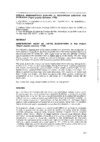Please use this identifier to cite or link to this item:
https://accedacris.ulpgc.es/jspui/handle/10553/76212
| DC Field | Value | Language |
|---|---|---|
| dc.contributor.author | Socorro, J. | en_US |
| dc.contributor.author | Fernández-Palacios Barber, Hipólito | en_US |
| dc.contributor.author | Izquierdo, M. S. | en_US |
| dc.contributor.author | Hernandez-Cruz, C.M | en_US |
| dc.contributor.author | Valencia, A. | en_US |
| dc.date.accessioned | 2020-12-02T10:28:24Z | - |
| dc.date.available | 2020-12-02T10:28:24Z | - |
| dc.date.issued | 1999 | en_US |
| dc.identifier.uri | https://accedacris.ulpgc.es/handle/10553/76212 | - |
| dc.description.abstract | Diversification requirements of European markets are promoting the production of news species in aquacufture. Sparídes constitute one of the most important families in worf d production of marine fish, with Pagrus majar in Asia and gilthead seabream (Sparus aurata) in the Mediterranean as leader species of this family. The red porgy (Pagrus pagrus) has been recently introduced in European aquacufture, being untif now Greece the only country with industrial production of this species. This study analizes the changes on larval morphometry of the red porgy during its first month of life. lt also studies relationships among the different analyzed parameters: total length, standard lenght, preanal lenght, cephalic lenght, cephalic height, swimmbladder lenght, swimm-bladder height, liver height, miotome height, body height. The different growth functions have also been determined with regard to the larval total leght. Finally the results have been compared with other specles, analyzing the perspectives of the larval rearing in red porgy as a candidate species for the aquaculture. | en_US |
| dc.description.abstract | Las necesidades de diversificación del mercado en piscicultura implican la producción de nuevas especies a nivel comercial que permitan flexibilizar la oferta. Los espáridos constituyen una de las familias con un papel importante en la producción mundial de cultivos marinos, siendo la dorada japonesa (Pogrus major) en el Extremo Oriente y la dorada (Sparus aurata) en el Mediterráneo los más extendidos. El bocinegro (Pagrus pagrus) está comenzando a introducirse en la acuicultura, siendo hasta el momento Grecia el único país que ha conseguido una producción industrial de esta especie. En el presente trabajo se muestra el estudio morfométrico de las larvas de bocinegro durante su primer mes de vida, así como la relación que existe entre las diversas variables analizadas: longitud total, longitud estándar, longitud preanal, longitud cefálica, altura cefálica, longitud de vejiga natatoria, altura de vejiga natatoria, altura del hígado, altura del miotomo, altura del cuerpo) con los cambios morfológicos más significativos durante su desarrollo. Además se han determinado las diferentes funciones de crecimiento de las variables con respecto a la longitud total de la larva, así como la relación existente entre estas variables. Por último se han comparado los resultados obtenidos con los de otras especies, analizando las perspectivas del cultivo larvario del bocinegro como especie candidata a la acuicultura. | en_US |
| dc.language | spa | en_US |
| dc.relation | Estudio sobre ia reproduccion y el cultivo larvario del bocinegro (Pagrus pagrus) como nueva especie candidata para la acuicultura (AGF94-0882-C03-01), CICYT | en_US |
| dc.source | VII Congreso Nacional de Acuicultura, Mayo, 1999, Las Palmas de Gran Canaria, p. 217-229 | en_US |
| dc.subject | 251092 Acuicultura marina | en_US |
| dc.subject.other | Red porgy | en_US |
| dc.subject.other | Morphometric | en_US |
| dc.subject.other | Larval fish | en_US |
| dc.subject.other | Paridae | en_US |
| dc.subject.other | Growth | en_US |
| dc.title | Estudio morfométrico durante el desarrollo larvario del bocinegro (Pagrus pagrus, Linnaeus 1758) | en_US |
| dc.type | info:eu-repo/semantics/conferenceobject | en_US |
| dc.type | ConferenceObject | en_US |
| dc.relation.conference | VII Congreso Nacional de Acuicultura | en_US |
| dc.description.lastpage | 229 | en_US |
| dc.description.firstpage | 217 | en_US |
| dc.investigacion | Ciencias | en_US |
| dc.type2 | Actas de congresos | en_US |
| dc.description.numberofpages | 13 | en_US |
| dc.identifier.ulpgc | Sí | en_US |
| dc.contributor.buulpgc | BU-BAS | en_US |
| item.grantfulltext | open | - |
| item.fulltext | Con texto completo | - |
| crisitem.author.dept | GIR Grupo de Investigación en Acuicultura | - |
| crisitem.author.dept | IU de Investigación en Acuicultura Sostenible y Ecosistemas Marinos (IU-Ecoaqua) | - |
| crisitem.author.dept | Departamento de Biología | - |
| crisitem.author.dept | GIR ECOAQUA: Ecofisiología de Organismos Marinos | - |
| crisitem.author.dept | IU de Investigación en Acuicultura Sostenible y Ecosistemas Marinos (IU-Ecoaqua) | - |
| crisitem.author.dept | Departamento de Biología | - |
| crisitem.author.orcid | 0000-0003-4297-210X | - |
| crisitem.author.orcid | 0000-0001-8048-3150 | - |
| crisitem.author.parentorg | IU de Investigación en Acuicultura Sostenible y Ecosistemas Marinos (IU-Ecoaqua) | - |
| crisitem.author.parentorg | IU de Investigación en Acuicultura Sostenible y Ecosistemas Marinos (IU-Ecoaqua) | - |
| crisitem.author.fullName | Fernández-Palacios Vallejo, Hipólito | - |
| crisitem.author.fullName | Izquierdo López, María Soledad | - |
| crisitem.author.fullName | Hernández Cruz, Carmen María | - |
| Appears in Collections: | Actas de congresos | |
Page view(s)
121
checked on Nov 23, 2024
Download(s)
109
checked on Nov 23, 2024
Google ScholarTM
Check
Share
Export metadata
Items in accedaCRIS are protected by copyright, with all rights reserved, unless otherwise indicated.
